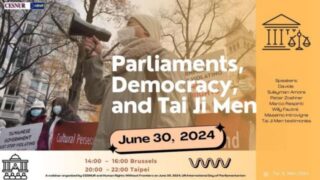Hostile forces fueled media campaigns against Tai Ji Men in Taiwan and the Unification Church in Japan, with a detrimental effect on their educational activities.
by Peter Zoehrer*
*A paper presented at the international webinar “Freedom of Education, Freedom of Belief, and the Tai Ji Men Case,” co-organized by CESNUR and Human Rights Without Frontiers on January 24, 2024, United Nations International Day of Education.


Education, regarded as a cornerstone of human development, is enshrined in Article 26 of the Universal Declaration of Human Rights (UDHR), promising access to quality education for every individual, regardless of background or beliefs. Despite this noble commitment, the realization of this fundamental right often faces compromise, particularly for marginalized groups subjected to discrimination. This paper delves into the profound implications of hate speech and media bias on the educational rights of two distinct religious groups—Tai Ji Men in Taiwan and the Unification Church in Japan—unraveling the intricate dynamics that undermine their educational activities.
Table of Contents
Tai Ji Men: A Case of Political Persecution and Media-Fueled Marginalization
Tai Ji Men, a spiritual organization rooted in Taiwan, weathered a storm of politically motivated investigations since the late 1990s. Allegations of tax evasion, later proved false, triggered the seizure or freezing of assets, including land in Miaoli and the Swiss Mountain Villa buildings near Taipei. These assets, originally earmarked for major educational institutions within the movement, became unavailable. Compounding this, Dr. Hong Tao-Tze, the organization’s leader, endured detention and a subsequent ban on foreign travel for an extended period. Ill-founded tax bills further compounded the challenges faced by Tai Ji Men, with these actions, fueled by political motivations, casting a long and detrimental shadow over the educational activities of its members.
The negative portrayal of Tai Ji Men in mainstream media served to exacerbate their predicament. Outlets consistently depicted the group in a distorted and unfavorable light, perpetuating stereotypes and prejudices that isolated Tai Ji Men members from mainstream educational communities. This deleterious media coverage hindered Tai Ji Men members’ employment prospects in education, and their children were often subjected to discrimination and bullying within school environments.


Unification Church in Japan: Combating Educational Inequity and Media-Perpetuated Stereotypes
The Unification Church, founded by the Rev. Dr. Sun Myung Moon in Korea in 1954 and now known as the Family Federation for World Peace and Unification (FFWPU), confronted persistent challenges in Japan. Since its founding the movement has been targeted by discriminatory policies and hate speech. In 1997, the Japanese government enacted a law prohibiting the Unification Church from operating schools, citing concerns about its teachings and activities. Though this law was eventually repealed, it left an indelible mark, serving as a stark reminder of the Church’s marginalization within the educational system. Unification Church students continued to face discrimination, exclusion, and harassment, impeding their access to quality education.
Media bias played a substantial role in exacerbating the educational challenges faced by Unification Church members in Japan. Negative media portrayal created a hostile learning environment for Unification Church students, discouraging their active participation in education and impeding their overall academic progress.
Article 26: A Shield Against Educational Discrimination
Article 26 of the UDHR provides a robust framework for safeguarding educational rights and ensuring non-discrimination in education. It upholds the right to establish private educational institutions, subject to certain conditions.
The actions of the Taiwanese government against Tai Ji Men, in flagrant violation of these principles, underscore the importance of upholding Article 26 to ensure equal access to education and the promotion of educational activities for all. The FFWPU in Japan suffered a similar fate.
Hate Speech: A Maligning Force in Educational Spaces
UNESCO’s dedication of this year’s International Day of Education to countering hate speech acknowledges its escalating impact, particularly with the proliferation of social media. It creates a hostile and intimidating environment that discourages certain groups and individuals from participating in the educational enterprise. By perpetuating negative stereotypes and prejudices, hate speech impedes the development of inclusive and respectful learning environments.


The Detrimental Impact of Hate Speech Perpetrated by the Media in the Case of the FFWPU in Japan
The persecution of the Family Federation gained new heights after a tragic event on July 8, 2022, when a man killed former Prime Minister Shinzo Abe, who had sent a video message to an organization affiliated with the Unification Church. Out of grudge, the 41-year-old Tetsuya Yamagami shot and killed Abe during a public speech. A press conference on July 12th further fueled a false narrative that the Church was to blame for the assassination, initiating an unprecedented witch hunt against the FFWPU.
To gauge the extent of media coverage regarding the Unification Church in Japan, a Google search of the keywords “Japan dissolution order against the Unification Church” yielded an astounding 1,180,000 results in a mere 0.35 seconds.
Incited through the media, members of the church, including families and children, faced a barrage of threats, harassment, bullying, hatred, violence, and even acts of physical violence. Over forty hate incidents were reported within a few months until the end of 2022. The government’s alignment with the media narrative resulted in severe consequences, including the request for a dissolution order against the FFWPU, a religious movement that had committed no crime.
Conclusion
The experiences of Tai Ji Men and the Unification Church serve as stark reminders of the imperative to safeguard educational rights and combat hate speech. Actively addressing the pervasive influence of hate speech can pave the way for more inclusive and equitable educational environments, ensuring that the fundamental rights of offering and receiving educational services are preserved for all, irrespective of their beliefs or affiliations.









